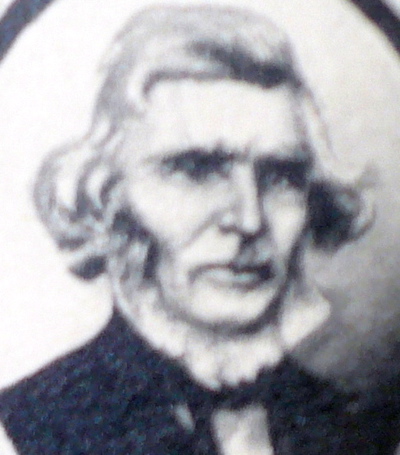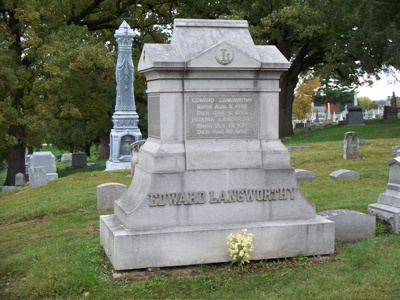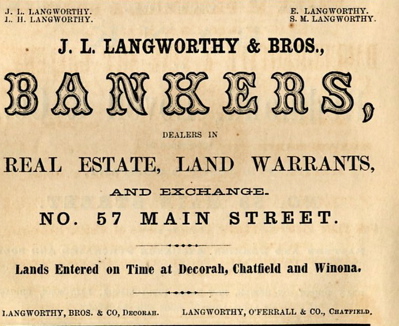Encyclopedia Dubuque
"Encyclopedia Dubuque is the online authority for all things Dubuque, written by the people who know the city best.”
Marshall Cohen—researcher and producer, CNN
Affiliated with the Local History Network of the State Historical Society of Iowa, and the Iowa Museum Association.
LANGWORTHY, Edward: Difference between revisions
No edit summary |
No edit summary |
||
| Line 1: | Line 1: | ||
[[Image:P1000296.jpg|left|thumb|150px|Edward Langworthy. Photo courtesy: Bob Reding]] | [[Image:P1000296.jpg|left|thumb|150px|Edward Langworthy. Photo courtesy: Bob Reding]] | ||
[[Image:edlang.jpg|right|thumb| | [[Image:edlang.jpg|right|thumb|200px|Gravestone in Linwood Cemetery]]LANGWORTHY, Edward. (St. Lawrence Co., NY, Aug. 3, 1808-Dubuque, IA, Jan. 5, 1893). In September 1832, Langworthy may have constructed the first house in the future state of Iowa. One of many eager miners of [[LEAD]], Langworthy and his brothers [[LANGWORTHY, James|James LANGWORTHY]] and [[LANGWORTHY, Lucius Hart|Lucius Hart LANGWORTHY]] were driven from the region in November of that year by soldiers from Prairie du Chien who had the responsibility of keeping whites east of the [[MISSISSIPPI RIVER]]. | ||
[[Image:langworthybank.jpg|left|thumb|250px|Dubuque City Directory, 1857-1858. Photo courtesy: Bob Reding]]Langworthy returned to the Iowa side of the river in April 1833. He built several homes and many stores. Elected town trustee, county commissioner, and a member of the legislature for three sessions, Langworthy was also a member of the constitutional convention when he proposed to exclude "negroes" from the state and to abolish the grand jury system. Neither idea passed. Langworthy helped create a claims system for the sale of mineral lands which was adopted by the public land office. | [[Image:langworthybank.jpg|left|thumb|250px|Dubuque City Directory, 1857-1858. Photo courtesy: Bob Reding]] | ||
Langworthy returned to the Iowa side of the river in April 1833. He built several homes and many stores. Elected town trustee, county commissioner, and a member of the legislature for three sessions, Langworthy was also a member of the constitutional convention when he proposed to exclude "negroes" from the state and to abolish the grand jury system. Neither idea passed. Langworthy helped create a claims system for the sale of mineral lands which was adopted by the public land office. | |||
As a city alderman, Langworthy helped establish schools, factories, and a street railway system. He supported street and road improvements. Members of the firm of J. L. Langworthy and Bros. were prominent. Following the financial panic of 1857-58, he became a stockholder and director of the [[FIRST NATIONAL BANK OF DUBUQUE]]. | As a city alderman, Langworthy helped establish schools, factories, and a street railway system. He supported street and road improvements. Members of the firm of J. L. Langworthy and Bros. were prominent. Following the financial panic of 1857-58, he became a stockholder and director of the [[FIRST NATIONAL BANK OF DUBUQUE]]. | ||
Revision as of 04:30, 20 January 2012
LANGWORTHY, Edward. (St. Lawrence Co., NY, Aug. 3, 1808-Dubuque, IA, Jan. 5, 1893). In September 1832, Langworthy may have constructed the first house in the future state of Iowa. One of many eager miners of LEAD, Langworthy and his brothers James LANGWORTHY and Lucius Hart LANGWORTHY were driven from the region in November of that year by soldiers from Prairie du Chien who had the responsibility of keeping whites east of the MISSISSIPPI RIVER.
Langworthy returned to the Iowa side of the river in April 1833. He built several homes and many stores. Elected town trustee, county commissioner, and a member of the legislature for three sessions, Langworthy was also a member of the constitutional convention when he proposed to exclude "negroes" from the state and to abolish the grand jury system. Neither idea passed. Langworthy helped create a claims system for the sale of mineral lands which was adopted by the public land office.
As a city alderman, Langworthy helped establish schools, factories, and a street railway system. He supported street and road improvements. Members of the firm of J. L. Langworthy and Bros. were prominent. Following the financial panic of 1857-58, he became a stockholder and director of the FIRST NATIONAL BANK OF DUBUQUE.
--
Source:
Dubuque City Directory, 1857-1858
Hudson, David; Bergman, Marvin; Horton, Loren. The Biographical Dictionary of Iowa. Iowa City: University of Iowa Press, 2008
History of Dubuque County Iowa. Chicago: Western History Company, 1880




